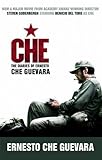The Cuban revolutionary was a prolific writer, and his works provide both personal and political insight
Che Guevara was killed on 9 October 1967, but new books by him are still appearing. He was a prolific writer and the Centre for Che Guevara Studies in Cuba continues to publish his articles and speeches.
But not all his writings were meant for publication. In 1950, he travelled alone in northern Argentina and wrote a diary of this bicycle trip on the hoof. These notes were found after his death by his father and published in Spanish, but not in English. They reveal his early concern for those who lived below the poverty line. Because he was a medical student travelling with hardly any money he asked for lodgings at hospitals and police stations, from where he observed this other Argentina.
The unrevised diaries of his first trip across Latin America were published in English as The Motorcycle Diaries after his death. In them we see an enthusiastic young man, full of mirth and a desire for adventure. The casual style of his notes has the immediacy and freshness of someone who is discovering a different world. But Che also discovered that what he had seen in Argentina was true of the rest of the continent. And when he had to spend time in Miami waiting for a ride home he saw how the gringo oppressing his continent lived. The contrast was astonishing and infuriating.
By 1953, now a doctor, he had left home again, this time never to return, since at the end of that trip he met Fidel Castro and joined his guerrilla force. They sailed from Mexico for Cuba in November 1956. The revolutionary war lasted two years, during which Che went from medical orderly to famed Comandante. The chronicle of this struggle was published during his lifetime as Reminiscences of the Cuban Revolutionary War. In it he tells us for the first time of his belief that popular forces can win a war against an army without having to wait for the right conditions: the insurrection itself will create them. This moving account reveals his humanity, his sense of humour and his capacity for self-deprecation as he tells us that during an encounter with the enemy he ran away so fast he would never be able to replicate such a feat.
Once in power in Cuba Che wrote Guerrilla Warfare – a Manual following in the footsteps of Chairman Mao and Vietnam’s General Giap, made available free to guerrilla movements all over Latin America. Here Che expands on his theory that armed struggle could result in victory even against established, entrenched regimes armed with modern weaponry, and that guerrilla movements based in the jungles and mountains of a country could lead the people to freedom. It also gave detailed advice on tactics – and consequently it remains the preferred manual of guerrillas the world over to this day.
The African Dream is the diary of his stint in the Congo in 1965. His opening words are: “This is the story of a failure”. He was as critical of himself as he was of his African hosts, who were not ready to liberate themselves from foreign domination nor unite their extremely rich country and its different ethnicities. What makes his narrative riveting is that it can be argued – as Nelson Mandela has – that Che’s African adventure was not the unmitigated disaster he called it, because it was a lucid report of the prevailing conditions in that continent which informed Castro on how to assist African nations fighting for their independence.
The Bolivian Diary is a record of Che’s final campaign. He was dead 24 hours after his last entry. It consists of notes he intended to expand, but it was not to be. Since the Bolivian Diary fell into the hands of his captors, the CIA intended to use it as propaganda against Che in particular and Latin American guerrilla movements in general. But surprisingly, a member of the Bolivian government photocopied the diary and sent it to Cuba. Castro published it in several languages, thus pre-empting the CIA’s plans to doctor the text for its own purposes.
It is refreshing to read Che in his own words since so much has been written about him by his detractors. On the one hand there is an intimacy to his diaries –because he wrote them for himself – which reveals the person rather than the public persona. But on the other, when he is writing about politics and revolutions, we encounter a driven man who was a committed socialist even in his sleep.
